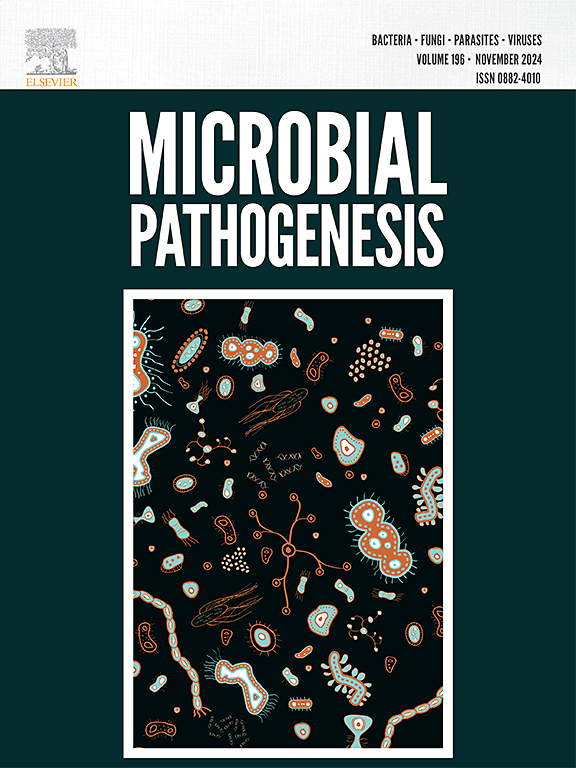患有持续淋巴细胞减少症的脓毒症患者体内微生物与新陈代谢相互作用的分子模式。
IF 3.5
3区 医学
Q3 IMMUNOLOGY
引用次数: 0
摘要
背景:持续性淋巴细胞减少症可被视为脓毒症患者获得性免疫功能障碍的一个重要指标。淋巴细胞减少症脓毒症患者的特异性免疫因子是否会发生变化以及与肠道微生物群和代谢物的相关性仍不清楚:本项单中心前瞻性观察对36例持续性(≥3d)(n=21)和非持续性淋巴细胞减少症患者的血液样本进行了淋巴细胞亚组分析,并对粪便样本进行了16S rRNA基因扩增子测序和非靶向代谢组学分析(结果:持续性淋巴细胞减少症患者的淋巴细胞比非持续性淋巴细胞减少症患者的淋巴细胞高,而非持续性淋巴细胞减少症患者的淋巴细胞比持续性淋巴细胞减少症患者的淋巴细胞高:持续性淋巴细胞减少症患者的28d死亡率和90d死亡率均较高,而CD3+T/LY、CD3+T细胞、CD3+CD4+T细胞、CD3+CD8+T细胞、Th1细胞、Th2细胞、CD45RA+Treg细胞均显著降低。16S rRNA结果显示,葡萄球菌、肽链球菌、布氏球菌、白念珠菌在持续性淋巴细胞减少症中明显富集。代谢组学分析表明,持续性淋巴细胞减少症中α-酮异戊酸增加,7-DHCA、α-MCA、β-MCA、HCA、LCA-3S、CA、UCA和柠檬酸减少:结论:在持续性淋巴细胞减少症败血症患者宿主受体与肠道微生物群相互作用的过程中,肠道微生物群多样性和胆汁酸代谢产物显著减少。这会影响肠道免疫细胞的各种炎症通路,导致机体免疫功能紊乱,这可能是死亡的主要原因之一。本文章由计算机程序翻译,如有差异,请以英文原文为准。
Molecular patterns of microbial and metabolic interactions in septic patients with persistent lymphopenia
Background
Persistent lymphopenia can be regarded as an important index of acquired immune dysfunction in sepsis. Whether the specific immune factor changes in septic patients with lymphopenia and the correlation to gut microbiota and metabolites remain unclear.
Methods
This single-center prospective observation conducted lymphocyte subgroup analysis of blood samples and 16S rRNA gene amplicons sequencing and untargeted metabolomics analysis of fecal samples from 36 subjects with the persistent (≥3d) (n = 21) and non-persistent lymphopenia (<3d) (n = 15).
Results
The persistent lymphopenia showed higher the 28d mortality and 90d mortality, while significantly lower CD3+T/LY, CD3+T cells, CD3+CD4+T cells, CD3+CD8+T cells, Th1 cells, Th2 cells, CD45RA + Treg cells. The 16S rRNA results showed that Staphylococcus, Peptostreptococcus, Bulleidia, Leuconostoc were significant enriched in the persistent lymphopenia. The metabolomics analysis showed that α-Ketoisovaleric acid was increased and 7-DHCA, α-MCA, β-MCA, HCA, LCA-3S, CA, UCA and Citramalic acid were decreased in the persistent lymphopenia.
Conclusion
In the process of interaction between host receptors and gut microbiota in patients with persistent lymphopenia sepsis, with a significant reduction in gut microbiota diversity and bile acid metabolites. That can affect various inflammatory pathways of gut immune cells, causing immune dysfunction in the body, which may be one of the main causes of death.
求助全文
通过发布文献求助,成功后即可免费获取论文全文。
去求助
来源期刊

Microbial pathogenesis
医学-免疫学
CiteScore
7.40
自引率
2.60%
发文量
472
审稿时长
56 days
期刊介绍:
Microbial Pathogenesis publishes original contributions and reviews about the molecular and cellular mechanisms of infectious diseases. It covers microbiology, host-pathogen interaction and immunology related to infectious agents, including bacteria, fungi, viruses and protozoa. It also accepts papers in the field of clinical microbiology, with the exception of case reports.
Research Areas Include:
-Pathogenesis
-Virulence factors
-Host susceptibility or resistance
-Immune mechanisms
-Identification, cloning and sequencing of relevant genes
-Genetic studies
-Viruses, prokaryotic organisms and protozoa
-Microbiota
-Systems biology related to infectious diseases
-Targets for vaccine design (pre-clinical studies)
 求助内容:
求助内容: 应助结果提醒方式:
应助结果提醒方式:


